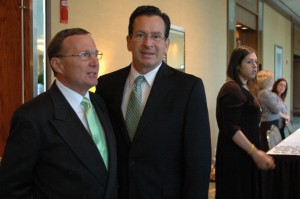
With the launch of Startup Connecticut, Gov. Dannel P. Malloy hopes to reinvent the way the state supports startups with high growth potential ”“ based on a model being touted by a former executive with Norwalk-based Priceline.com, Connecticut”™s great success story of the digital age.
Connecticut becomes the third state in the nation to adopt an entrepreneurship initiative under the Startup America Partnership run by Scott Case, the former chief technology officer of Norwalk-based Priceline.com Inc. Illinois and Tennessee also are participating and Case said he expects another 10 states to do so as well over the next two months.
“We”™re networking those states together and we”™re seeing amazing growth in places that are not necessarily the traditional innovation hubs,” Case said. “The assets that Connecticut brings to the table are really remarkable. Not only do you have some fantastic universities in Yale and the University of Connecticut, but you got amazing large companies here like GE and Sikorsky that have a rich history of building great new innovations here in the state.
“When another entrepreneur comes up to me and says, ”˜all I need is money”™ ”“ that”™s a red flag,” Case added. “You really need a lot more than that. You need things like expertise, you need things like support services ”¦ The private sector will step up with the right capital as these entrepreneurs step their game up as well.”
To that end, the program will include regional centers to bring technology, concept testing, mentors, funding and key business connections to companies where and when needed.
Malloy envisions multiple regional centers dotting the state in which entrepreneurs can get assistance, without terming them incubators and without saying how many the state would create. Both Bridgeport and Stamford have launched incubators in the past 18 months and Norwalk has considered doing so without yet saying whether it will push ahead.
“We”™re going to work with partner organizations ”“ chambers of commerce, other professional organizations, universities and colleges,” Malloy said. “We are near launching one of those centers.”
With a special session of the Connecticut General Assembly looming this month, Malloy suggested the state would lower the threshold at which angel investors can take a tax credit on investments in startup businesses, currently set at $100,000. More than a dozen Fairfield County startups have been qualified to produce tax credits under the program.
For now, however, Malloy does not appear to be contemplating any kind of a broad-based tax cut for startups or other small-business owners that some think would be the best way to reach a wide number of companies, whether new or established.
“Most businesses are looking for tax breaks and incentives, and not the government coming in,” said David Lewis, CEO of Stamford-based OperationsInc and co-founder of the CEO Roundtable, which scheduled a meeting with Malloy this month. “I probably helped six startups so far this year. I have a hard time seeing any of those people showing up in Hartford and viewing the state government ”¦ as being a viable partner.”
At a jobs summit Malloy convened this month in Hartford, Harvard Business School professor Michael Porter said Connecticut has to build from its strengths as it works to reinvigorate its innovation economy.
“Connecticut is a remarkable state,” Porter said. “For a relatively small state, you have enormous breadth of sophisticated businesses and the question is how can we keep those sophisticated businesses dynamic, how we can supply those businesses with the right skills, how we can migrate into the new fields based on the incredible strength we already have?”















